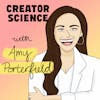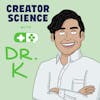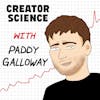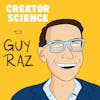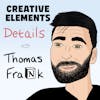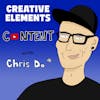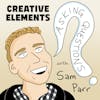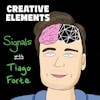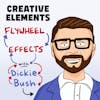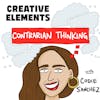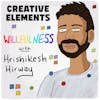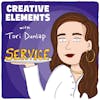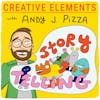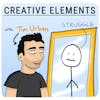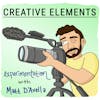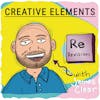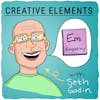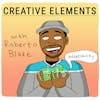
#68: Roberto Blake – The story behind 12 years, 531K+ subscribers, and nearly 35 million views on YouTube
Play EpisodeRoberto Blake is dedicated to building the Creator Economy. He’s focused on helping Creators and Influencers build brands and businesses online.
Roberto Blake is dedicated to building the Creator Economy. He’s focused on helping Creators and Influencers build brands and businesses online.
His YouTube channel has grown to more than 500K subscribers and more than 34 million views. He has nearly 50K followers on Twitter, and another 23K on Instagram.
Founder of Awesome Creator Academy, Roberto educates and motivates small business owners and content creators, and helps them in building their brands and businesses.
He is known for his direct and transparent way of teaching education-based content with a strong motivational message of empowerment. Roberto is a Keynote speaker who travels far and wide to connect with creators and entrepreneurs, dedicated to delivering on the promise of their potential.
In this episode, we talk about how Roberto built his channel, his rule for diversifying the platforms you invest time into, the six streams of income he’s cultivated, why he’s decoupling his business from YouTube, and how he’s had to adapt all along the way.
Follow Roberto Blake on Instagram
Follow Roberto Blake on Twitter
Full transcript and show notes
***
ABOUT JAY CLOUSE
Subscribe to my weekly newsletter
Enroll in my course on podcasting, Podcast Like The Pros
***
LISTENER SUPPORT
Join our community on Facebook
Support this show through Buy Me A Coffee
***
SPONSORS
Try Podia and save 15% for life as a Creative Elements listener
Start your free trial of SavvyCal and get your first month free using promo code ELEMENTS
Get a free month of Blinkist Premium
Try Grammarly for free and save 20% on Grammarly Premium
***
PODGLOMERATE NETWORK
This show is a part of the Podglomerate network, a company that produces, distributes, and monetizes podcasts. We encourage you to visit the website and sign up for our newsletter for more information about our shows, launches, and events. For more information on how The Podglomerate treats data, please see our Privacy Policy.
Since you're listening to Creative Elements, we'd like to suggest you also try other Podglomerate shows surrounding entrepreneurship, business, and careers like Rocketship.fm and Freelance to Founder.
Learn more about your ad choices. Visit megaphone.fm/adchoices
Roberto Blake 0:00
You should have a secondary and tertiary platform. And then I think you should still have your own website and your own email list. Because even if it's not the majority your audience you need to consolidate. And you need to have an owned audience of 10,000 people so that you can start over anywhere.
Jay Clouse 0:19
Welcome to Creative Elements, a show where we talk to your favorite creators and learn what it takes to make a living from your art and creativity. I'm your host, Jay Clouse. Let's start the show.
Hello, welcome to another episode of Creative Elements. I hope you're entering this next hour with me in a good mood and an open mind. But if life has you a bit down right now, let's try to put that aside and enjoy this short time that we have together. One of the absolute best parts of my job here as host of the show is that my relationship to consuming content is much different now. Not only do I get to enjoy people's work itself, but I look at it through the lens of deconstruction. How did this creator make this thing? Why did they do it that way? How does their business actually look? And I keep my eyes open to new guests all the time. Because for this show to be as impactful as it can be. I can't be limited to creators that I've known and followed for a long time I need to get outside of my bubble and find creators who are totally new to me. That lens is what brought me to today's guest, Roberto Blake. I've known another creator Brendan Hufford for several years now. Brendan has a podcast called SEO for the Rest of Us, which I've been a guest on before, and he has some other even more impressive guests too. One of which is Roberto Blake. He shared a clip from his interview with Roberto on Twitter, and it really caught my attention. Here's that clip.
Roberto Blake 1:53
If you decide that you're not going to do this click-baity title or this style of thumbnail when there's clear evidence that is what resonates with the average consumer. If you decide that you're gonna do something weird and quirky for the sake of being original and it tanks? That's on you homie. That's your fault because he goes expensive and you just paid the price for it. Think about in the product and consumer world of e-commerce and even physical products how original is anybody and is not being original really hurt anybody sales. How original can we be about smartphones? Everybody's come up with a clever original take on smartphones. What happened to them? Where are they now? The market is the market as GaryVee likes to say you want to be original cool if nobody cares, don't be surprised.
Jay Clouse 2:32
I thought that was a really strong and refreshingly honest take on originality. Yes, of course, we want to be special and original, but sometimes that leads us to fight upstream unnecessarily. And so I think Roberto is right, to a strong degree. Sometimes it doesn't serve me to be completely original. So I went down a rabbit hole, Roberto has been on YouTube since February 2009.
Roberto Blake 2:59
My name is Roberto Blake. And this is a quality test of the Sony Webbie HD video camera available at Sonystyles.com, this camera runs about 199 right now, you can probably buy it off Amazon for about that price or a little lower. There's a combo with a four gigabyte memory stick pro two card works pretty good. Um, I haven't had any problems with it so far. And as you can see from this video, the quality is actually really decent for anything you want upload to the web. So just feel free to pick that up from Sony directly or from Amazon. Like I said, I haven't had any problems with it. And again, this is a quality test of the Sony HD Webbie. Alright, thanks.
Jay Clouse 3:46
Roberto's channel started with product reviews, Photoshop tutorials and vlogs about graphic design. He's been a self taught creative all of his life.
Roberto Blake 3:55
I started coding at 13 years old in the AOL 6.0 days. Yeah, you've got mail, like that was welcome you got mail. That's that's the era of the internet I come from. I grew up on it quite literally, as a Yahoo Geocities egg site forums.
Jay Clouse 4:13
And there was something about YouTube that drew Roberto in early will talk about this in the interview. But YouTube has only been around since 2005.
Roberto Blake 4:20
I was probably about 24, 25 years old. I graduated from high school back in 2002. YouTube only came three years later after I was a high school graduate. So I was like 21, 22 when YouTube came out. So I didn't grow up with YouTube. Like many of the people today. There are people today who since the time that they could form cognitive thought YouTube has existed in the world.
Jay Clouse 4:45
That's pretty trippy to think about. Today, Roberto is dedicated to building the creator economy. He's focused on helping creators and influencers build brands and businesses online. His YouTube channel has grown to more than 500,000 subscribers and has more than 34 million views. He has nearly 50,000 followers on Twitter, and another 23,000 on Instagram. In this episode, we talk about how Roberto built his channel. His rule for diversifying the platform's you invest time into the six streams of income he's cultivated, why he's decoupling his business from YouTube, and how he's had to adapt all along the way. I'd love to hear your thoughts on this episode. As you listen, you can find me on Twitter or Instagram @JayClouse. Go ahead and take a screenshot tag me, let me know that you're listening. And before we dive in, take a moment to subscribe to my weekly episode emails. Every week I send an email about the episode along with a behind the scenes on how I booked the guest. You can subscribe to those emails at jayclouse.com and the link is in the show notes. Okay, ready to go. Let's talk with Roberto.
Roberto Blake 5:54
YouTube came out in 2005. I remember watching YouTube videos with my friends at my friend Malcolm's house we would like gather around his laptop in the kitchen and we would watch these like terrible Terry Tate office linebacker commercials it was
Jay Clouse 6:12
Yes,
Roberto Blake 6:13
That was the YouTube I remember.
Jay Clouse 6:14
Yes.
Roberto Blake 6:14
We watch the too hot for TV commercials from the old days. Old Superbowl commercials. We've largely went to YouTube in the first two or three years of YouTube to watch ads. That's the irony plays about ads. And that's all we watched.
What was it GoDaddy, I feel like ?
Oh, yeah, yeah, you had like the GoDaddy, you had the Doritos, you had the Snickers you had like all these. And then you had like a lot of just old commercials that you grew up with nostalgically from like the 80s that were being uploaded. So it was like, we literally were watching YouTube for ads back then. There wasn't high level original content in the first couple of years of YouTube. And like anybody, we had some independent film aspirations and the early days again, I don't even remember and a lot of my friends those channels I'm sure deleted but I was like doing stuff with my friends on YouTube. Before 2009 I think I was even like making anime music videos back in 2005 and 2006 as young people are want to do back in the days make anime music videos to Linkin Park right that's that's all the rage. That's what all the kids did. Right?
Jay Clouse 7:18
Oh my gosh, I remember that. I remember the exact video you're talking about the nobody's listening animated video from Linkin Park. Oh my god.
Roberto Blake 7:26
Yeah, yeah. So like I so I'm like, I'm literally old school, YouTube OG YouTube, but back then. It was also largely just a place that people put videos and were like expressing themselves. vlogging was not what it is known as today, which was largely defined by Casey Neistat. Casey is a tremendous creator and OG creator on the platform. And he's actually somebody that not only do I admire, but like has come to be a friend over the years. And when it comes to the concept of longevity, there's probably nobody that can speak more to the longevity of a YouTube career than Casey Neistat. It's probably Casey Neistat, probably also Gary Vaynerchuk are the only two people that I've ever met that I think can fully appreciate and tell you what it's like to have a legacy YouTube career. The only other two people I can really think of might be Marquez and Justine.
Jay Clouse 8:20
What is what does that longevity mean to you? Why is that worth calling out?
Roberto Blake 8:24
It's worth calling out because YouTube itself as a platform is only 16 years old, which means there's literally no one who's had a 20 year long career when it comes to YouTube. Today in the modern internet, you can find people who have had a 20 year stint in graphic design, web design, web development, computer programming, you can look at the modern internet. And there might be players who can say I've had a 25 year lifespan in this industry. So when you want to talk about longevity, look at all the people who may have started a YouTube channel even attained maybe a gold play button from YouTube. Most of those OG career creators, even the greats even the biggest are not active creators today. It's only a handful of people like Philip DeFranco, iJustine, Marcus Brownlee, Gary Vaynerchuk, and Casey Neistat, in terms of OG creators that started within the roughly first three or five years of YouTube, they can say they have a decade long career, if you look at me, I've been around on this platform for over a decade. I've been very active in the last eight years, but I've been in this ecosystem from its genesis.
Jay Clouse 9:35
When did you decide that not only am I going to upload a video to YouTube here and now, but this is actually going to be something I put concerted effort into.
Roberto Blake 9:43
2013 the summer of 2013.
Jay Clouse 9:45
And why is that? What happened in 2013 to spur that?
Roberto Blake 9:48
I think with me being a freelance graphic designer there was there's a couple of things there. First of all, I'd always I've always had the itch to teach something I know to people and there's a scale that video provides, I kept being asked questions over and over again about a lot of the things that I do by people. And it became very practical to just make a tutorial video, it like, literally became very practical to say, why don't I just preserve everything that I know about software in terms of graphic design, and video editing, and Photoshop and digital art? Why don't I just preserve my way of doing it? And my efficiency and my process? Why don't I just preserve that with online video. And also, it might benefit other people. And then if I make any few extra bucks, that's great. But it's also a really good way to showcase my ability I might get client work out of it. That was what my thought process was, that's where I was at was that I wanted to pass on things that I've learned to people, because I felt like when I went to college, back in March, right, like back in my day, you have to understand, technology was not what is today. And even when you had these technology oriented courses, you had largely professors who could not use the software, as good as me, a student who was doing it at home all the time, I knew the software better than them. And they were literally taking our money, handing us textbooks for software, if you can believe that. And there weren't online video tutorials in 2002. there just weren't. So I would largely think that my impetus to do everything I do on YouTube largely comes to frustration, chip on my shoulder about a lot of different things. There was no practical way to teach me the skills that I had, I had to fumble through it. And could you imagine how much more ahead of the game I might have been as a as a teenager or a young person, as it is I barely was able to afford community college, I had to work two jobs and pay for it out of pocket and all those things. Imagine the value of free education and what that would have meant for my life to give me a specialized skill, and a trade that could provide for me for the rest of my life. And it's a high income skill on top of that, as now manual labor trade. Like, that's revolutionary and thought. So for me, I didn't set out to change the world or anything like that. But I did think it would be cool. If someone could attain my skills for $0, at least at the start to get their feet wet, and actually learn from somebody who does it for a living and is paid for living, versus people who the last time they worked on this stuff was maybe 10 or 15 years ago before academia, no offense to anybody in education, I just feel that there's a practicality to doing something in real time. And learning from a practitioner in real time that's doing it actively. And then also when it comes to software. To be fair to those professors, the software hadn't existed for very long, and it wasn't around probably at the fundamental part of their career. So the expectation that they would be proficient of mastery, or be very educated about it, I understand having something else thrown on top of you at work on top of your other responsibilities, and said, okay, we've changed the standards. So here's another part of your jobs for the same paycheck. So I'm not blaming them. But ultimately, I was underserved.https://freelancing.school/what-is-freelancing/
Jay Clouse 13:17
This is something that I noticed when I was doing research for this interview that I really appreciate about the way you speak and present. It's really easy to see systems that are broken and get angry at the system and not recognize the constraints that are put on the system that people within the system that cause it to be the way that it is and it seems like you always kind of call that out as far as I know why it's this way, but doesn't mean it should be this way.
Roberto Blake 13:38
Exactly. But because I'm trying to be fair because I feel that fair mindedness, objectivity, fair mindedness and wanting to solve a problem rather than specifically focused on assigning blame. Do you realize how great of a politician I could get away with being if I only focused on assigning blame and then leveraging my, my speaking ability charisma, and then using a populist message of telling people who to blame instead of how we're going to fix a problem? It'd be it'd be childsplay but instead, I've taken the long suffering path of actually being thoughtful.
Jay Clouse 14:10
So 2009 you put the first video 2013 you say Actually, I want to start documenting things that I do so I can teach other people how to do it. When did YouTube become something that you thought okay, actually, maybe I can generate revenue from this and not just try to drive clients my business.
Roberto Blake 14:25
Within one year. But it would, it was still the primary mechanism was going to be I wanted to drive clients to my business but within one year, I not only figured that out because ad revenue was nothing is still nothing and then I can tell you that I ended up signing a very unfortunate MCN deal as a small youtuber after a year with about 12,000 14,000 subscribers. I locked into giving up 50% of my ad revenue because back then, youtubers didn't tell you how YouTube works, which might have also be wide help teach creators now another chip on my shoulder, another broken system, right? So
Jay Clouse 14:56
What's an MCN deal?
Roberto Blake 14:58
So an MCN deal is a Multi-Channel Network deal. Basically, they make you a lot of promises, they tell you that they'll help you collab with larger YouTubers who are also part of their network, they tell you that they can negotiate and get you better advertising revenue, which largely turns out not to be true, by the way. And then they also will often make promises of pitching you to brands and helping you get access to free product reviews. None of those things ever actually happened the entire time I was a multi channel network. And what they do is when you're a small YouTuber, and you have no leverage, they'll tell you something like, hey, you're only making this much a month tell you what we'll give you like an extra $50 or $100. On top of that, or will let and and what we'll do is, if you're making like $200 or $300 a month, cool, we'll let you keep up to $450 of whatever you make before we even touch a dime of what you're making. And the expectation is, it won't be a big deal, because for that period of time, you probably won't grow that fast or you won't explode or anything. Unfortunately, in my case, between 2014 and 2016, fortunately, and unfortunately, I got to 100,000 subscribers, which means that they were getting 50% of a significant amount of money, and providing no services and no value in return. And so but thankfully, my contract would then expire. But the problem was there was a system with YouTube where if I left the network, I would lose some of my data, specifically the data round my revenue earnings during my time with the network. I'm a very data driven person, and I want to access that data. Now since my contract expired and they wanted to renew me, and I was someone with leverage at that time, they made a 90-10 split 90% in my favor. So no longer 50-50 with a cap, it was a 90% revenue deal. I was not able to negotiate a renewal bonus, which I did lobby for, and things like that to be able to do equipment upgrades, and so on so forth. Again, during my entire tenure, they did not negotiate or bring a single brand to the table, I did all of that myself negotiate all my deals, they did not help with any contracts, legal fees, nothing of any significant value, they give you access to a dashboard where you might be able to barter some services or get discounts on things like copyright, free music and all that I was already paying for those services where I got them as an affiliate. So again, there was zero value. This ultimately felt like being exploited by a pyramid scheme. And the unfortunately no larger content creators warn smaller content creators about this. In many cases, we found later that either they were part of MCNs in a larger capacity or had equity or were being paid by them, or working at an MCN was their part time or even their full time job while also being a content creator. So there was no one warning smaller channels and advocating for them and telling them that everything an MCN provides everything a multi channel network provides a content creator can do for themselves, be taught to do for themselves and give up no equity in their business.
Jay Clouse 18:00
Man.
Roberto Blake 18:01
That's ultimately why I think I went on to do is I ended up teaching content creators to do it themselves.
Jay Clouse 18:06
After a quick break, Roberto and I walk through the most important moments and decisions for his channel on his path to 100,000 subscribers and beyond right after this. Hey, welcome back to my conversation with Roberto Blake. Before the break, Roberto told us that he began taking YouTube seriously in 2013. And that by 2016, he had broken 100,000 subscribers. So I asked him looking back, what were the critical moments that happened for his channel during that time?
Roberto Blake 18:35
Well, the first thing was from 2013 to 2014. The goal was to try to not miss a week, which that didn't work, not miss a week of uploads. So that consistency but that consistency rewarded with the compound interest. The other thing was my channel was originally very focused, I was focused on software tutorials, mostly around Adobe products, and also my experience in my career and my career background in creativity, my careers in creativity, graphic design, photography, video editing, and then also teaching people what being a freelancer is really like, but being independent with, you know, that self employment, like finding clients, you know, evaluating freelance websites and platforms and type type of thing, a few dabbling a little bit in web design, because even though that was something I'd been doing, and I'd been paid in corporate for that, and I maintained my own websites, which I still actually very much do to this day. I felt like sometimes I was getting a little bit behind the curve of some of the technologies on that. So I started to shy a little bit less toward that even though I still believe in it. Today, I've actually would like to talk about a lot more because now with these wonderful website builders and e-commerce and everything like that, and things like Kajabi and Shopify and Squarespace and yeah, I still can do WordPress stuff, and I still can code I can still code still got the shops. But you know, now I feel like well, no, you can speak a lot more to the broader base of beginners about these things and You don't have to be all program a person, you know, you don't have to, like I've gotten over how pretentious certain industries are about gatekeeping who can teach what? And I'm like, Look, I have a business that is very successful. At this point, I'm much more confident saying, You okay, you can say I can't teach that. But like, just do it better than if you think I'm wrong.
Jay Clouse 20:21
Okay, so you had you had 2013, 2014.
Roberto Blake 20:24
Consitency
Jay Clouse 20:25
Consistency and focus.
Roberto Blake 20:27
10k subscribers by focus and consistency.
Jay Clouse 20:30
Okay, and then what happened after that,
Roberto Blake 20:32
So 2014 to 2015, starting 2015 with 20,000 subscribers, having continued upload consistently, and see results, prove that it wasn't a fluke, to me. Also, during that time, I discovered the wonders of the Amazon affiliate program. And I'd also expanded a little bit into saying, Well, let me talk a bit about the the tools that I'm using, and the resources I'm using, because I was still using largely budget gear and I was advocating, you know, you don't have to always have the most expensive thing in the world, it helps, it's much better. But if you if all you have is this, and this is all you have in your pockets, here's what I can produce with those same budgets as you. And here is what the best bang for your buck is. And here's, hey, I don't have all these laptops to review. Here's the one I own. Here's the ones I researched to compare to this, because, okay, the $450 laptop I was working on conked out, I ended up upgrading to a $650 laptop. So I had to research bang for buck on that there was I was given as payment for a gig, an iMac by a client. So then there was things I could talk about with Mac and Mac versus PC. I've been using both in my corporate career for years. So I had experience with both and I could compare software. And I could compare the ecosystems. So I was expanding the range of beyond, here's software tutorials, and then hey, here's a little bit of beginner career advice to. Well, here are also tools of the trade beyond the software. Let's talk software. Let's talk hardware. Let's talk about money. Let's talk about decision making. Let's talk about the real benefit and value of your formal education. So I started beginning to get comfortable on camera. And there that was a big one. That's just by virtue of making 100 videos, make 100 crappy videos, as I like to say,
Jay Clouse 22:22
Cutting in here quickly, because Roberto's thesis of making 100 crappy videos is an idea we've heard another YouTube creator talk about too. Back in Episode 37, Ali Abdaal told us that he took a similar approach in the early days of his channel.
Ali Abdaal 22:36
I knew that I would be producing crappy videos for the first 100. So I wanted to get through those. And then I was going to release this magnum opus of this, this video, and things worked out really well, so.
Jay Clouse 22:45
Did you get advice about that from somebody like, Hey, your first 100 videos are going to be crap? Or did you just hypothesize that because you thought so?
Ali Abdaal 22:54
I actually got this advice does another YouTuber called Simon Clark, he was one of the first few in the UK to do the university vlogging thing to like 10 years ago, he's been on YouTube for like a decade now. And Simon had a video where he said that, like if you're getting started on YouTube, you just need to accept that your first 50 videos are going to be crap.
Simon Clark 23:11
And lastly, tip number 10 edit. The best way to get better editing is to edit I was told once the start of my my YouTubing career, that home, the first 50 videos you make are terrible. Once you accept that, and you make them, you move on, and it is so so true. And it sucks to be told that someone is just starting. But when you start, you're probably terrible. And arguably nowhere is that more true than in editing. When you're starting out. You don't really know what you're doing. And that's absolutely fine. If you're watching this and you haven't edited a vlog before I implore you, the best way to get better editing vlogs is to edit vlogs.
Ali Abdaal 23:46
And I thought okay, let's extend that analogy further. I know my first 100 videos are going to be crap. And so I need to get through them as soon as possible. And then I can stop being good.
Roberto Blake 23:55
So if by 2015, my thesis of making 100 crap videos manifested in my own body of work, and I also got to a point of confidence to have strong opinions about things. And I was also doing better as a freelancer and like, you know, not struggling financially and getting to a good place in 2015. So, in 2015, I expanded into the idea of doing multiple weekly uploads almost daily, and then that was the real there was no viral video no snowball effect, I am literally the beneficiary of volume. So by making Okay, making 100 videos got me to 20,000 subscribers within two years. What if the concentration of effort of making 365 videos what what would that do was my thesis like? What if I just go daily? I love this I'm enjoying this I'm building a community I like talking to people I like being on camera. I like doing this thing. I never thought I'd love this this much. And there's some potential here. And even though I was getting a horrible deal, the thing is a network predatory as they might be thought I could be a valuable commodity. I've realized in that moment, even getting 10,000 a year was abnormal for the majority of YouTube creators is not something 99% of creators do, just because we see a couple of people go big and go viral in one year and get 100,000 or a million. Most content creators 90% of content creators, I can tell you this with all certainty, I have that. And I've talked to people about this at companies. 90% of all content creators never get 10,000 subscribers in their entire life, ever, in the history of the platform, 90% of creators have never gotten 10,000 is a much bigger deal than people think to get 10,000 ever whole lifetime of your career. I did it in a year. And I didn't even have the personality for YouTube. So I went daily. And that was like the big change.
Jay Clouse 25:47
In 2013 when you're doing this, you were doing client work. At what point did you stop doing client work, or at least had the optionality to stop doing client work?
Roberto Blake 25:55
Technically, if you look at my actual business model, I've never stopped client services if I just pivoted what type of client services work I ended up doing. I've never stopped Client Services.
Jay Clouse 26:05
Why not?
Roberto Blake 26:06
I think one actually like it. Like these conversations are very much the same kind of conversations I have with coaching clients. Because I do one on one coaching. I have conversations like this with brands, when I do consulting for brands working b2b with brands is still Client Services. You can even argue that working b2b with brands and being a brand ambassador and talking about campaigns and the budget and doing reviews and negotiating contracts, you could make the argument that that's still Client Services at the end of the day. So like it without realizing it many craters under the guise of brand deals, they're still doing, ultimately Client Services in a b2b model. They're they're doing a business to business model. without realizing it. We just call it influencer marketing and brand deals. But that's a business to business service at the end of the day.
Jay Clouse 26:54
What about psychologically when you consider YouTube to be your quote-unquote, full-time thing?
Roberto Blake 26:59
I don't believe it is. I think it's a series of multiple part time jobs that people think about, if you're a YouTuber, you're largely a copywriter, in many ways. You're a video producer, a video editor, you're an on screen talent or commentator or performer of some kind. You also are your own business manager in negotiating your deals, if you don't have a talent agency to do that, you then also are your own IT department for the most part, there's so being a YouTuber is a series of multiple part time jobs. I think that the problem with people, which is basically entrepreneurship 101, by the way, the problem with people think of a YouTube as a job or a full time job is it's legitimate work. But there's no nuance to how we talk about work and value. And therefore people only use the frame of reference of employment. Employment versus self employment versus entrepreneurship are literally three distinct experiences. And having lived that life, I can tell you that they are very distinct experiences. So that's why I don't necessarily it's hard. I mean, for the purposes of branding, or SEO or making it simple for people, we use the phrase full time job. But the thing is, the government looks at a full time job and says well, working 30 hours a week, some employers would say well, exclusivity, being a content creator, is none of those things. Because there are people who make substantial. Some people say okay, well does it provide you with your sole source of income content creators who know better know, there's no such thing as a sole source of income, or even a primary source of income. Like you hedge and you diversify, you hedge and diversify. In my case, I have six categories that I diversify income sources across as a creator and as a creative entrepreneur. So for me, I have a hedge in terms of where's the my derive that I've even gone so far as to try to start massively diversifying how much of YouTube even makes a pipeline for off of YouTube, and I even tried to keep, like YouTube probably will end up for the most part being a disproportionate traffic source. I'm trying to decouple my income from the platform. No offense team YouTube, I've tried to decouple my income from the platform because I think there's too much anxiety and relying on anything but yourself.
Jay Clouse 29:27
When we come back, Roberto, and I dive into the six different streams of income he tracks for his business. And a little bit later, Roberto shares his best advice for getting started on YouTube today. So stick around, and we'll be right back. And welcome back. Before this interview, I watched a bunch of videos on Roberto's channel, and one of those videos was his 2020 income report.
Roberto Blake 29:51
YouTube money is something everybody's always interested in and last year, I made a video telling you how much money YouTube paid me for the entire year of 2019 And since a lot of these videos don't talk about things like brand deals, or even affiliate marketing, it's something I want to break down for you guys in today's video, because there's a ton of misinformation about how much money youtubers make.
Jay Clouse 30:13
In that video, Roberto breaks down his income into three categories, YouTube channel specific revenue, affiliate revenue, and brand deals. And before the break, Roberto mentioned that he had six streams of income, so I asked him if you could elaborate on all of those streams.
Roberto Blake 30:28
So you have the royalty income that can come from YouTube. But instead of calling it YouTube adsense income, I just refer to it as royalty income, partly because one, that's how it's classified tax wise, because people don't realize there are other platforms, and some of them may pay you just as well as YouTube in royalties. If you're a streamer for some of you, that could be Twitch, if you're an educator, even if you don't have a big audience, you can go to Skillshare with zero audience build courses and to ecosystem that's largely a search engine too and it has internal promotions, you could have no audience but have expertise, I think employees looking to transition should look at making micro courses on Skillshare. And the royalty income on that could be significant even for a smaller audience because it pays per minutes viewed instead of individual minutes viewed. So technically, Skillshare could pay better than YouTube, by far, especially early, early, it'll pay better, I guarantee it, look at all the adult, it's fantastic. So you have royalty income, you have affiliate income for me Software as a Service, a lot of its recurring. So that's actually really good. Because it means even if I stopped making content, I'll still make 1000s of dollars of true passive income, you have brand deals. For me a lot of those relationships are recurring long term sponsorship, I have a coaching business, which means I have a membership in terms of a group coaching program. So that's a significant amount of income 1000s of dollars. But my youtube channel also has what's called channel memberships, and people are paying for that. We're about to launch exclusive exclusives for that as well, which means more people will sign up for that. And then that could become significant. We have a few 100 members, I think now maybe 200 members, but that could be significant if it becomes let's say if I get even 1000 members, 1000 true fans, right 1000 members, and let's say their median average is $5. YouTube takes 70%. So I'd still be making about $3,500 a month from 1000 to 1000 true fans that want to support what I'm doing or want access to exclusive bonuses, or just want to say, Hey, we want to sustain and protect the content. And we don't want you to worry about the advertisers. So you have that you have products, I do a lot of different things in terms of my platforms. But one of the things I have is I have a digital platform called within Kajabi that does my membership, my one on one coaching and a lot of my e-commerce products, we have the YouTube starter kit, it's a bundle of 100 Photoshop templates for YouTubers that was so successful that that product, which I think I made in 2018, I think I've put maybe 40 or 50 hours total into that product, that product has generated $90,000 in revenue since inception with almost no maintenance.
Jay Clouse 33:08
Beautiful.
Roberto Blake 33:08
Almost no maintenance over the last total three years last year produced $20,000 in revenue. And I think that we put five hours of maintenance into it in that year. So the ROI on something like that is fantastic. It's inspired me to build a new platform that I can't announce yet. But I'm doing it in Shopify, to build a whole template store for creators, it's going to be crater template store, it's going to be something that I hire designers to help with, we might even bring a full another full time designer on so I'm leveraging the background of my career and even what I use in my roots of YouTube. And building a completely another business entity out of it that I think over the next two to three years will scale up to being another six figure platform independent of YouTube. And I could always just buy ads against this thing outside of YouTube off of revenue and scale it so I can be fully independent of the platform. I'm not beholden to what social media regulations do or what social media content platforms decide to internally regulate with their policies and their terms of service updates. You know, the things creators are most frustrated with they're feeling that they're being limited. I am looking for more examples and to be an example to creators of creating freedom that only you're not used. You're used your platform to get freedom from your nine to five job, but now you're beholden to the platform's Well, what's the next step of that not being beholden to anybody? So except for your community, eliminate that by diversifying and expanding? Last one I think was services so Client Services. So right now I do coaching but we also have a branding agency where we build media kits for creators COVID coming to a close so I have always been a photographer and I've always been a photo bug I've I've thought about this for a while we added doing a boutique photoshoots you know it's not cheap. It's not affordable for everybody, but it's not meant to it's meant to be something that, hey, if you're a full time content creator, it's worth it to be able to hire somebody who has the background, but also is a legit professional photographer has all the gear, the experience has been doing it. And they can use my own stuff as a reference and look at how I've handled it within my brand. And what we create around that. So it's something that can help someone to have a refresh their brand, once a year, every six months where they know they have quality, professional photos, they have stuff that was retouched for them. It's made with Photoshop in mind, knowing that you're going to want to do tweaks knowing your own cut yourself out of backgrounds. I already know what this should be like. So it's different than hiring a photographer that is in from the social media landscape in the first place. So those are the different things that obviously I consult with brands. You know, we already talked about the brand deal. So it's a brand's members, products, services, affiliate, and royalties, all six.
Jay Clouse 35:59
You're describing this act of decoupling of your revenue from the platform of YouTube. And I feel like this is something that if people aren't thinking about right now, they should start thinking about it is dependency on a platform? Is this the step of the journey that you are at and other people starting today need to go on the same journey to get to this step? Or is this something they should be thinking about from the start?
Roberto Blake 36:21
I think that the, the thesis I have for creators now, is I think that they should be platform agnostic. I think creators get overly emotionally attached to whatever platform delivers them the most success or that they have the most fun doing. And then their identity, becomes being a YouTuber, a Tik Toker, or Twitch streamer, instead of their identity being I'm a content creator. And these platforms are my tools. These are my paints, these are my markers. These are my chalks, these are my pens, they're not me, I think that platforms, we have to put the platforms in their place not and that's not about disrespecting the platforms, or the people who work very hard over there. But I mean, you have to make these platforms, right sizing your life. And then being right size in your life is making them a tool and a vehicle to accomplish a goal. Not a goal for yourself. I think that if you're saying being a YouTuber is your dream, and it's the only thing you want, that you're setting yourself up, to always be at the mercy of the platform and having to be beholden to what fits either the terms of service or even the direction the culture that the platforms go in and a creator confine themselves outgrowing that a lot sooner than they think.
Jay Clouse 37:35
This is easy, I think are easiest for writers podcasters, where the ecosystem is pretty much already set up in a way where it's easy for you to have an own audience. But for visual creators, where it's hard to create the toolset that Tik Tok gives you or Instagram reels gives you or host your videos somewhere else. What is the strategy for somebody who's using a visual platform like Tik Tok, Instagram, YouTube to build an audience, but once to ultimately have a more consistent, reliable way of communicating with them.
Roberto Blake 38:06
You have to build your personal brand, your name has to go beyond the convenience of finding you on that platform. And you have to get 1000s of people invested in you, in you as a creator. And also means you need to decentralize, you need to stop worrying about taking that piece of content away as a view you're taking away from Tik Tok or YouTube or whatever, you need to repurpose, and repost that to different places, you need to put it in my opinion up on something like Patreon, you want to talk about the hosting side, go go with Patreon. Now again, they also have terms of service. But I think Patreon shouldn't just be looked at as membership, I think Patreon should be looked at as a distribution and publishing model. And I think that for creators that they should be looking at it as another way of hosting or backing up their content. Even if we're someone discovers you is fine, or someone likes to consume you, that's fine. That's consumer choice. That's audience choice. But you shouldn't limit your focus and your attention to that just because that's where people are finding you, you should make it so that you never go away, you should make it so you cannot disappear. You should be preserving your body of work. And so if something doesn't exist in three places, it doesn't exist. That's why I believe you should have a secondary and tertiary platform. And then I think you should still have your own website and your own email list. Because even if it's not the majority of your audience, you need to consolidate. And you need to have an owned audience of 10,000 people so that you can start over anywhere. In my opinion, I believe in that, I believe is a goal objectively, that you should be trying to get 30% of your audience from your largest platform over to your secondary and tertiary platforms, your number two and number three platforms, and that you should at least try to get 10% of those people onto a platform that you own. That's The model I believe in, if you and if you start with that in mind, it's possible to own a much larger size of your total audience from the beginning. And to build that personal brand.
Jay Clouse 40:11
Yeah. So to, to kind of repeat what I think I'm hearing, you're not saying that it's plausible, necessarily, or are necessary to avoid platforms like YouTube, tik tok, Instagram, you know, completely. It's not about avoiding those platforms. It's about understanding that you're on rented ground, and you should try to transition those people onto other platforms that you have more control over.
Roberto Blake 40:35
Exactly. So and I think it's about freedom. I mean, you want to look at freedom and right, people are using these platforms, and they're using being a content creator, a YouTuber, a Tik Tok or a Twitch streamer, whatever. Largely, they're using it to emancipate themselves from their nine to five jobs where they do after that, they try to stop renting. Why do they try to stop renting even though it means more responsibility, more work, more effort, more maintenance? Well, it means that somebody can't kick you out. Same thing with these platforms, these platforms can kick you out, you're renting. So the idea is to build something. And then it's also to build notoriety, like, Okay, you've moved you, you own your job, and you're self employed, oh, you own a business that now is bigger than you and other people are involved in investment, you went from employed to self employed to entrepreneur and scalable now, all right, you went from living with your parents to renting to then hopefully owning and having a home ownership. And then maybe you expand beyond that the goal here has always been the pursuit of freedom. And it's always been the pursuit of controlling your own destiny and being in a position to dictate your terms and dictate your rules. And then beyond that, you can look at expansion in another way where you might build multiple businesses, or you might do go into rental properties, or into Airbnb or something like that, or into subleasing or house hacking, or whatever. Because now it's about that only having that it's about going beyond yourself. And I think that once you build the foundation of a strong personal brand, it's then about being able to have some type of stake or equity, even in a talent beyond yourself, because ultimately, isn't that what the platforms are doing. So we need to start moving, and understanding what the platforms are. And we need to act accordingly in my opinion.
Jay Clouse 42:18
Culturally, how important is it to build this personal brand, as you're calling it, which I'm assuming you're saying it's like around your name, versus build a non personal brand, but a brand on the less or even a pseudonym.
Roberto Blake 42:31
You can do either a pseudonym can still be a personal brand, because it's still built around a personality. I mean, look at the Mr. Beast, look at Dream and Corpse. Dream and Corpse Husband has strong personal brands and independent creator loyalty, they have literally entire armies of fan bases, literally armies, that they could mobilize and deploy against anything that they do, right. And that thing is, it's centralized in that figure, in that person, even in this case, a fictional character that they created of themselves a fictional character of themselves that they created, all right, an avatar, an embodiment of their idealized self, or what have you. So you can still have a personal brand, and be an avatar in that way, even a faceless creator, as they like to call it right. And then you have these, the V tubers, especially in the anime community, in the Twitch community, you have V tubers, and V streamers. So the thing that I look at with this is, you can have a brand that almost functions like a corporate brand, you can have an entity. And that could even be something that lends itself to having multiple hosts that gives you longevity, that model is already been done. We already know that. So we already understand that. So that's not difficult. That's not even like, you know, a question to me. But the foundation of a personal brand, whether it's you as your legal government name, or a fictitious version of yourself, or a pseudonym, whether you're Mr. Beast, Pokemon, pewdiepie, MBKHD, iJustine, whoever, it still ultimately comes down to an individual identity that you're branding, and that you're communicating that you're putting out there. And the thing is, I think it's essential for people's career to make a name for themselves. But I think you have to make a name for yourself beyond the platform. And you and I think that comes down to impact people hate the word influencer. But what I look at it is is I look at as measurable impact, I look at 500,000 subscribers, and I don't see an audience that I would have access to because YouTube's algorithm doesn't even work that way. doesn't work that way. What I see and what I'm trying to get creators to say is, if you see a follower count or you see a subscriber count, what you are measuring is the number of people that with a certain level of certitude you've impacted, and that is what we're using as a way to interpret your value based on your potential to impact people and the proven track record of that cap that your is this market valuation of your impact statement in my view, in my view, your follower count your subscriber count. It's basically your impact statement. And then that is what we're using as part of your valuation as a creator. And the thing is, even as a human being moving through the world, impacting 10,000 people would be significant. So the fact that people diminish that whether it's the creators themselves, people in the industry or people looking through the outside, and we use the the phrase, quote, unquote, small and people made the word influencer pejorative, how are you doing that when literally, we're talking about someone who has impacted 1000s, 10s of 1000s, 100s of 1000s millions of human beings, I don't think you can really turn influencer into a pejorative when we look at that.
Jay Clouse 45:52
Totally. Well, to wrap this up, I'd love to just speak to the super early stage or aspiring creator on YouTube today. What is your advice for them getting started today to make a go of it in 2021?
Roberto Blake 46:06
Decide in the moment, whether you're in this for a career or a hobby, don't feel pressured to make it a career. Don't lie to yourself, if it's more than a hobby, or you if you want it to be more than a hobby, because it's okay to want it to be more than a hobby. But if you decide that because I assume that we're talking about people for whom it's not going to be a hobby, is that correct?
Jay Clouse 46:30
Right.
Roberto Blake 46:31
If you've already come to the conclusion that this is not something that you're happy to just keep a hobby and you genuinely in your heart of hearts want to be a career, then you should treat it like a career, you should show it the same respect as a career and you should look at it as a career in sports or entertainment. And you should realize that just because you worked really hard or you put in a lot of effort doesn't entitle you to an audience and that your expectation of everything should be zero. And even if you get a follower, count your expectations. From a healthy standpoint or a mental health standpoint, do not think that a follower account or an audience means that you have an advantage in the algorithm. The minute that you think that you'll be disabused of that the moment you have an underperforming piece of content. So what you need to understand is you need to approach this every single day the way an athlete would, an athlete if they're smart, doesn't look at the last game or the last round. They start over from zero every time and they're in different level of difficulty that comes with that. Because to be an athlete, you must embrace stoicism you must become indifferent to difficulties that you're presented with you soldier on it sucks and okay, fine, and you just keep it doesn't change the fact that you have to get it done. So, you will feel demotivated when motivation fails you discipline will not that is the ethos of an athlete. When motivation fails, you discipline will not an athlete does not feel like doing those setups, crunches, or that 10k run, I promise you I swear to God as a former cross country runner, that nobody feels like doing the warm ups the stretches or the workout 90% of the time. No, no, no, no, no, we do it anyway. So how you feel has very little to do with what has to get done. And when you understand that, when you become indifferent to that, you'll find that things will progress somewhat easier. You know, and it will simplify things, it will simplify things. And you also should do things that you enjoy doing, you shouldn't do it only with the outcome that you want in mind, you should have that intention. But it can't be the only driver of Oh, I'm doing this for the money. When we say don't do this for the money. We're not trying to discourage you or we're not speaking to anti capitalism or anything. We're saying that there's not a good enough amount of money by itself. to rationalize hardship, you're not going to magically feel better about doing something just because it makes you a lot of money sometimes. So you need some motivation beyond that. And also realistically, the money is not very good the first three years unless something out of the ordinary happens the first three years suck and sometimes you make bad deals like I did in my early career. You know, watching a Roberto Blake video might help you not make a bad deal. So my advice to the beginning creator, my practical advice is find a common sense approach to content creation, find a common sense approach to YouTube, make it right size in your life. Consider the fact that for a very long time for two or three years, you're going to probably work a 40 hour a nine to five job and if you want to take this seriously, you're going to have to put 20 to 30 hours into being a content creator as well when you look at all the task of being a content requires requires. If you are not okay with that or you feel that that's abusive or that's going to burn you out or that surely there must be another way to be successful. Problem is there usually isn't most success requires an investment of time, if not an investment of money. If you work a nine to five job then you realistic If you're in America, and you're earning an average salary, you're gonna love money to be able to put into this to accelerate your timeline in any meaningful way. So guess what, and there's, by the way, there's not a lot of ways you can just by throwing money at people have tried, and I've wasted money trying, people buy a lot of fake courses, people buy a lot of gear, they don't know how to use people do a lot of dumb stuff, people buy ads, people buy subscribers thinking, Oh, if they see I have subscribers, and they'll give me subscribers. Nope. So do not think that you could just throw money at it understand that in a lot of cases, it's going to come down to hours doesn't matter how many years you've been on YouTube, America, my hours you're putting in. And if you can't do that, understand, there's some kid maybe 18, 20 or 16 years old, it doesn't have your responsibilities, because I'm talking mostly here to the people over 30, who started as adults like I did, like there's so understand you cannot at 30 have the same upside of a lack of responsibility, and an abundance of time that someone younger may have not all young people mostly. So you have to grain of salt that your circumstances aren't the same. You have to make this fit your circumstances. And you have to appreciate that you may not be able to grow at the pace you want. If you don't have a situation that accommodates it. So you also need to look at your time. And you have to understand that speed matters, refining your abilities, matters, refining your abilities, improving your craft all of that just like sports, or being a musician or doing any number of technical careers, it will actually be the same thing. So that's why the average is three to five years of success, because you're also learning as you go. And it's not really that practical to expect that you have to learn things you've never done before. Never edited video, why would you be good at it? You've never written headlines? Why would you be good at it? You've never done SEO? Why would you be good at it? You've never made a thumbnail in Photoshop, why would you be good at it? Why would you be good at anything that you've done less than 100 times? You've never spoken on camera to an audit? Like you've never grown it? Why would you be good at it? Why would you be good at anything you haven't done 100 times, the sooner you can do something 100 times with the goal of every time doing it not just doing check a box, just posting the post. Sooner you make your first 100 crappy videos, the sooner you can make your first good video, the sooner you get through those 100 good videos, sooner you can make your first great video. And then once you know how to do that you don't unknow it. So that's what my real practical advice here is, is let patients have it's perfect work, practice makes progress. And then understand that you should start every single day as a content creator expecting nothing from anyone but yourself. And you can't even expect results from yourself in terms of an outcome or how people are gonna feel or what you're going to get out of it. The only thing you can expect from yourself is your ability to execute is the execution. Everything that comes after that is whatever it is, all you can expect for yourself is to be able to execute against the process that has gotten you this far. And that's it. That's not very comforting, I don't think but is the probably the most realistic thing somebody can tell you. Because I'm not trying to sell you the YouTube dreams. So then I can also sell you a $5,000 course.
Jay Clouse 53:27
I really enjoyed this interview. Roberto has spent so much time thinking about his own business on YouTube and hearing how intentionally he's taking decoupling that business from YouTube is really interesting. Like he said, it's not about avoiding platforms that are rented ground, they serve a useful purpose and helping you create reach. But his point about consolidation and bringing those people into a world where you have more control over the relationship is really smart. And I love his idea to focus on three platforms, primary, secondary and tertiary platform to de-risk your creative business. If you want to learn more about Roberto you can subscribe to RobertoBlakePSD on YouTube or follow him @Robertoblake on Twitter. Links to both are in the show notes. Thanks to Roberto for being on the show. Thank you to Emily Clouse for making the artwork for this episode. Thanks to Nathan Todhunter for mixing the show and Brian Skeel for creating our music. Every week I send an email with each episode to tell the story of how I booked the guest. People seem to love it. And you can get on that email list by subscribing to my newsletter at Jayclouse.com/emails of Link is in the show notes. If you'd like this episode, you can tweet at me @JayClouse and let me know if you really want to say thank you. Please leave a review on Apple podcasts it might get read on the show. Thanks for listening, and I'll talk to you next week.
Most Popular Episodes
New to the show? Check out some of our most popular episodes.






